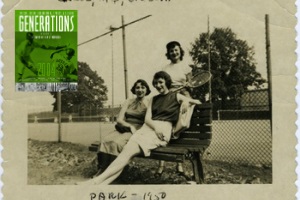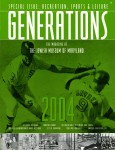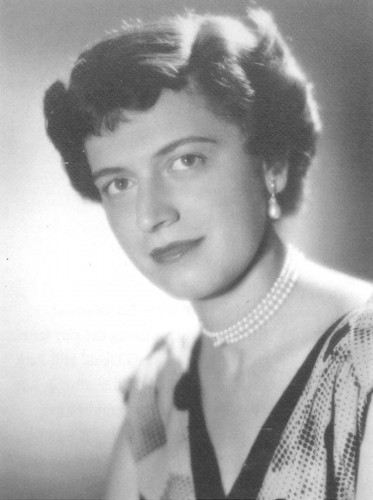Match Point Part II

 Article by Barry Kessler with Anita Kassof. Originally published in Generations – 2004: Recreation, Sports & Leisure. This particular issue of Generations proved wildly popular and is no longer available for purchase.
Article by Barry Kessler with Anita Kassof. Originally published in Generations – 2004: Recreation, Sports & Leisure. This particular issue of Generations proved wildly popular and is no longer available for purchase.
Part II: An Interivew with Mitzi Freishtat Swan
Anita Kassof (AK): Mitzi, tell us about what happened on the tennis courts in Druid Hill Park in 1938.
Mitzi Freishtat Swan (MFS): You could say that it was a protest, and it also was a demonstration because it was well advertised. We put up flyers, we sent notices to the Sun papers, to the police department, to the city officials that we were going to do this. It wasn’t like there was a complete surprise. They knew that we were going to be there.
This was right after World War II. It was 1948, the war ended in 1945. And the tennis courts in Druid Hill were segregated; there were black tennis courts and there were white tennis courts. The black tennis courts were in very poor shape. They were rutted, there were only a couple of them, and they were in very poor condition. Some white friends of mine had some black friends that they used to play tennis with. And they used to meet them on the black tennis courts, but then they decided, well, why not come on the white courts? And they were summarily told to get out by the Park police. There was never any law against interracial tennis; it was just a City policy. And if you disobeyed the policy you were told to get out or you were arrested. So we decided that we were going to stage this protest.
AK: When you say “we” do you mean the Young Progressives?
MFS: Yes, we were part of the Young Progressives, the third party that was under the sponsorship of the Progressive Party of Maryland. This was before the elections of 1948 and as members of the Young Progressives we were very active in promoting Henry Wallace as the third-party candidate. And we believed that things should be integrated. People came home from World War II – having fought for democracy and liberty and all these kind of things – and they came home to a city that was just as segregated as when they left it, and the parks and all the park facilities were segregated. Blacks couldn’t even go to the picnic groves. So it was a pervasive policy that was taking place in the parks, and we thought that was wrong. And we wanted to make a statement to that effect. So, we talked it over, and we decided that a protest would be a good thing to do.
Barry Kessler (BK): When did you start getting involved with the Young Progressives and what brought you into the group?
MFS: Many different things. My parents were part of the Progressive Party, so I saw a lot of the literature that came from them. And there were also some things that were taking place in Washington. As a high school student, with a big group, I heard Paul Robeson in Washington. That was just a marvelous atmosphere. I got involved with the Young Progressives because of the things that I heard, because of the things that I read. That’s why I got involved. I was actually doing it more than my parents were.
AKL Tell us about what you did on the day of the protest.
MFS: On the day it took place, I went with another member to the park and we got permits. You had to have a permit to be able to play on the courts. So we got two permits, one for the women to play on and the other for the men to play on. And we were there at 8 o’clock in the morning to make sure we got those permits, and then we had to wait until 2:00. But meanwhile the Park police knew that we were going to be there and the City police knew we were going to be there. And let me tell you something, they had those police cars waiting for us. I later wrote a story about it in one of my writing classes. I might have exaggerated a little bit but I said, “And there they were, on the crest of the hill, hands on their hips and handy billies in their hands.” And they were. They had that club just waiting to crack a couple of heads.

AK: How did you feel before the protest?
MFS: I was worried. I was scared. To be honest, I was scared to death. I didn’t know what was going to happen. And when we went to get the permits, I was really nervous. And then the whole day, waiting. Once you got on the tennis courts it was all right. We just fell in. We had two whites and two blacks on each court, playing doubles. But it was that waiting around, not knowing what’s going to happen or anything like that. Once you saw all these people there who were supporting you, though, that gives you an added impetus to do it.
When it was time to play, the men started up first and as soon as they went to hit a ball the police – six, seven – came on the courts and told them to leave. And they refused. And the police said, “If you don’t leave we’re going to arrest you.” Well, some of the guys sat down and they had to be carried off. Then when they came to the women’s courts, we started playing and the same thing happened. “Course we didn’t sit down. We walked off. They were putting everyone in the wagons – black mariahs they used to call them- except three of us who were the youngest, females, were taken in a police car. I’d just turned 18.
We were taken down to the Northern Police Station. And three of the women were put in the judge’s chambers and the rest of them were put behind bars. And they were whoopin’ it up and they were singing songs. They were having a good time down there. And then of course bail was posted. It was the next day that we had the hearing before the magistrate of the court. And, oh, it was ridiculous. Some of the police said they were hearing all kinds of songs they didn’t recognized, but people were actually singing My Country ‘Tis of Thee. They were singing patriotic songs! And they were singing the Negro national anthem. But the police said they had no idea what it was.
AK: How did you determine who would play in the match? Were all of the black players members of the Young Progressives?
MFS: Some of them were members of the Young Progressives. But most of them came from the Baltimore Tennis Club. And that was an all-black tennis club. It’s still in existence today. And a lot of those players were much better than we were. Jeannette Fino and I were tennis players, so we automatically said we would play. A lot of us were tennis players. I lived right across the street from the park and I played tennis and my brother subsequently became a champion tennis player, all from playing in City parks. And this other Gloria, she was a tennis player. The only one who wasn’t really a tennis player was Mary Coffee.
AK: Would you describe the crowd and what was going on with the spectators?
MFS: We brought a big crowd of people, and I mean we had a big crowd. It was like a picnic atmosphere. It was very, very upbeat. Everybody had their blankets out and their picnic baskets and all that kind of stuff. And it was a really nice, a really happy thing. Until the arrests started, and then the whole crowd came up to their feet, and they were hollering. They were saying, “This is Nazi Germany! Why can’t they play? They’re American citizens!” Well, some of the people got a little boisterous and they got arrested for disorderly conduct. But there was absolutely no violence whatsoever.
My family was there, except my father was still working. He came later. But when I was being arrested, my brother was chasing the police car. He was crying, which he didn’t usually do. I mean, he must have been wondering, what’s she being arrested for?
AK: But all the players, black and white, were arrested?
MFS: Yes, all the players were arrested. And also some people were arrested who were mingling outside the Northern Police Station. Because everybody was out there waiting to see what was going to happen and some of those were arrested. There were 22 people altogether who were arrested.
AK: I understand you met your future husband that day. What brought him to the protest?
MFS: He was a seaman. A whole bunch of them came. The flyers came to their union hall. They were also part of the Progressive Party too. They had a very liberal wing in their union. And so a whole bunch of them came up to be there. We both got arrested the same day. He was one of the ones who was arrested for disorderly conduct. He was not a tennis player. He was one of the seamen who came there. There was a whole group that came over. And so I didn’t see him that day, but I met him in court. Oh, we had a big party that night. That’s when I got to meet him. That was in 1948. And I graduate college in ’51 and I got married in ’52. So I didn’t see him all the time during that time. As a matter of fact I didn’t particularly like him when I met him. I mean, I liked him but there were no sparks or anything like that. That wasn’t until later, when I started to get to know him. He was very romantic.
Continue to Part III: An Interview with Mitzi Freishtat Swan Continued
